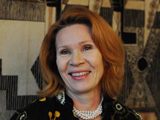An Interview with Ms Iina Soiri, Director of the Nordic Africa Institute (NAI), Uppsala, Sweden
31 Oct 2015
Please elaborate on NAI's mission.
We have three missions that are equally important. First, we conduct and promote research on Africa's social, political and economic development. We accomplish this particular mission by relying on our own staff of researchers, by encouraging Africa research in all Nordic countries, and by linking Nordic and African researchers together.
Our high-quality research provides a solid basis for us to then conduct our second mission, which is to spread reliable and relevant information about modern Africa and its development. In this sphere, we strive to create active policy dialogues that involve policy and decision makers in all of the Nordic countries.
Third, we gather and collect books, journals, and official documents that facilitate the research and study of modern Africa. We then make these materials easily accessible and widely available, along with databases, in our library. Through our book exchange agreements, interlibrary loans and remote access contracts with universities, libraries and institutes on all continents, we are able to support the needs of researchers from all over the world.
What are the main areas and themes that NAI focuses on?
We choose our focus areas and themes in coordination with the Program and Research Council, which monitors NAI and advises its Director. (Each Nordic country has two members on the Council - one from the country's research community and one from its foreign office and/or aid administration.) At present our research is organized around four research themes: conflict & democratization; migration & mobility; rural development and natural resources (including water); and urban dynamics. It's important to note, however, that our research activities aren't static. We constantly review our focus, primarily via our current research activities and our mapping of the changing landscape in Africa research and the scholars who work within the discipline. To us, it's very important that our focus areas correspond to the development challenges faced by Africans. It's only through this approximation that we can produce new insights that are relevant to the shaping of Nordic Africa policies.
Can you tell us more about NAI's outreach activities, including your scholarship programs and the materials available in your specialized library?
Our flagship programs include the Guest Research Program, which provides the opportunity for African and Nordic senior researchers to work at NAI for a maximum of three months. Second, we have one month-long scholarship programs for masters and PhD students who are pursuing post-graduate studies at a Nordic university. Third, we encourage postdocs - with their own funds - to possibly join the institute's staff for a maximum of 2 years. Finally, we welcome externally funded researchers to become part of our creative research environment. You would naturally expect me to say that these are all very attractive positions, but given that they're completely filled right now, the members of our targeted research communities seem to agree with me.
In the case of our outreach activities, our researchers organize and take part in many conferences, seminars, workshops and other events every year. In September 2016, for example, we will once again stage the biennial "Nordic Africa Days" conference, which will draw hundreds of participants from the Nordic countries, Europe and Africa.
Our specialized library, I'm proud to say, is both comprehensive and unique. It contains approximately 70,000 volumes of African social science literature, including 400 recurring journals and even a collection of contemporary African fiction. These statistics, however, don't tell the full story about our library. A couple of months ago we hosted a Canadian researcher who focuses on Kenya. He had tried in vain for a very long time to get hold of government protocols, reports and other sensitive documents that were crucial for his research. You guessed it -- thanks to our library, which systematically takes in and collects government documents from all African countries, he found what he was looking for.
How would you characterize the current and future status of economic justice in Africa?
One way to approach this admittedly broad question would be to look at the remarkable progress Africa has made in achieving the UN's Millennium Development Goals. By using this metric, one can argue that significant progress has been made in spreading economic justice in many African countries. More people in more countries have been able to 1) benefit from basic services (education, health, water, etc.), and 2) take part in democratic elections, and many other forms of governance. In other words, more African people have been able to start making decisions over their own lives as well as on the development of their societies. This is especially true of women. Countries such as Namibia, Senegal, and Rwanda are global trendsetters in promoting women's equality, which is crucial to elevating the wellbeing of societies in general.
At the same time, another trend is also emerging. Because inequality within societies has increased, access to economic justice has become more differentiated between the haves and the have nots. This is especially true within Africa's more fragile states, which are afflicted by prolonged, complicated conflicts and/or bad governance.

